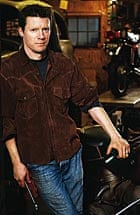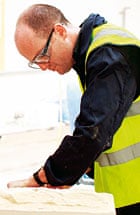Until I spent a day learning stonemasonry (or, to be more accurate, failing to learn stonemasonry), I'd never given much thought to the fact that walls are flat. But after a few hours in a boiler suit and safety goggles, hacking incompetently at a block of Portland limestone, the flatness of walls – especially stone ones, in churches and stately homes and suchlike – suddenly struck me as completely astonishing. Consider three facts: first, stone comes out of the ground in massive, irregular, knobbly hunks. Second, by the time it ends up as part of a wall, it's almost perfectly flat. And third: most of those walls were built long before the invention of enormous motorised buzz saws that slice cleanly through stone in minutes. Instead, that flatness was achieved by masons chipping away, precisely and patiently, with chisels and mallets. If you ever think about the art of stonemasonry at all, you probably think of intricate carvings, or elegant columns, or gargoyles. Yet those vast expanses of flatness are actually pretty amazing. You don't tend to notice them – but to make them unnoticeable takes a great deal of skill.
Which, as it turns out, I don't have. "This is the first thing you do on your masonry apprenticeship – they give you a big rough block of stone and say, right, make it into a square block," says Oli Clack, the frighteningly accomplished 21-year-old who has been assigned as my tutor at CWO Stonemasons in Chichester. There's one such block on a table before us; the floor is deep in stone dust. Clack, demonstrating the task, does it without really concentrating: light taps of his mallet on the chisel cause large chunks of soft stone to fall away in exactly the right places, leaving a flat surface that looks like it's been there all along, waiting for someone to reveal it. CWO's stonecarvers are some of the most talented in the country, which is why, when I arrive at their 100-person headquarters, they're midway through a multimillion-pound project to replace decaying windowsills at Buckingham Palace. "You just have to forget it's the Queen's house and get on with it," says Bernard Burns, the managing director. Even so, I can't help noticing that a certain amount of effort is expended to make sure my erratically wielded chisel never gets anywhere near stone destined for the monarch's windows.
I've travelled to Chichester to test the argument made by the American philosopher Matthew Crawford in his book, The Case For Working With Your Hands: Or Why Office Work Is Bad For Us And Fixing Things Feels Good. Crawford has a doctorate in political philosophy and used to work for a thinktank; now he runs a motorbike repair shop in Richmond, Virginia, and he knows which life he prefers. His short, passionate book is an effort to show that this doesn't just apply to him: the way we've come to devalue manual competence, he argues, explains why so much modern work feels empty and unfulfilling. He's not really suggesting that we white-collar workers should all abandon our desk jobs in favour of rolling up our sleeves and getting our hands dirty. But his firm conviction is that the skilled trades – car repair, plumbing, carpentry, electrical work, stonemasonry – offer a way of thinking about life, and relating to the world, that we could all do with adopting. "The important thing," he says, "is whether a job entails using your own judgment or not."
Proudly clutching his new PhD, Crawford's first job was for an outfit called the Information Access Company, where his task was to condense academic papers into short summaries at the rate of 28 a day. It left him feeling exhausted, and weirdly detached: the 28-per-day quota made it impossible really to engage with anything he was reading. Later, he became director of a rightwing Washington thinktank — where, he writes, "I was always tired, and honestly could not see the rationale for my being paid at all – what tangible goods or useful services was I providing to anyone? This sense of uselessness was dispiriting." After all that, turning his motorbike hobby into a job felt like a rebirth. It was physical and concrete, with clear criteria of success and failure: the bike was there in front of him, successfully fixed or not. It was more intellectually challenging than the thinktank, too, and the overall effect was energising: "Seeing a motorcycle about to leave my shop under its own power, several days after arriving in the back of a pickup truck, I suddenly don't feel tired, even though I've been standing on a concrete floor all day," the now 44-year-old Crawford writes. As the owner drives the bike away, "I can hear his salute in the exuberant 'bwaaAAAAP! blum-blum' of a crisp throttle, gratuitously revved. That sound pleases me, as I know it does him."

Conventional wisdom, of course, usually frowns on career transitions like this, or dismisses them as self-indulgent, middle-class romanticism. The ethos of the new economy is "upskilling", pushing more and more people to get university degrees and become "knowledge workers" as manufacturing jobs disappear, or are outsourced to China. Web programming skills might save you; joinery skills probably won't. Yet, as Crawford notes, "blue-collar" and "white-collar" no longer mean much. Assembly-line workers and car mechanics are both blue-collar, while call-centre workers are white-collar, but it's arguably the mechanic who has the most job security: when your car breaks down, you need him here. You can't fix cars over the internet.
Crawford's main perspective isn't economic, though: it's that manual competence makes you feel better, and behave better. It gives you a sense of autonomy, a feeling of responsibility for your work and for the material world, and ultimately makes for better citizens. This is, he admits, an "aristocratic" vision. If you're a manager who spends all day manipulating spreadsheets, or a marketing executive who toils in the intangible world of brands, Crawford's point isn't that you should try to think of an electrician as your equal. His point is that the electrician is a better person than you.
The first thing I learn, as I touch the chisel to the block and take an initial, tentative swing with the mallet, is that stone – especially limestone – isn't the impenetrable material I'd imagined. I thought I'd have to hammer with all my strength to make the tiniest indentation; instead, great slices of stone are flaking off, threatening to ruin all hopes of the flat surface I'm aiming for.
Apprentice masons soon learn, Clack explains, that stone is a temperamental substance that needs to be coaxed and cajoled into the right shape, not dominated with brute force. It has its eccentricities. It can fall apart under its own weight while you're carrying it. Or water can seep in, freezing and leaving air-pockets, so that you'll be chiselling away when suddenly you hit one, and the delicate patterns you've spent the last week carving fracture into pieces and fall to the floor.
What emerges from my chiselling isn't what most people would call flat. But for someone who's famous among friends for a lack of hand-eye coordination, it's surprisingly non-terrible: you could certainly tell, by looking at it, that flatness was what I was aiming for. "That's not too bad, actually," is Clack's verdict, and though I know he's being polite, this makes me feel great. Unlike an office performance review, where nothing's really measurable, and where blandly content-free praise is the norm, there's a clear, indisputable goal here. I haven't met it, but that's the curious thing: it feels better to know exactly what you're aiming for, even if you miss.
Crawford sees the dwindling of manual skills as part of something bigger and more alarming: a fundamental change in how we relate to our physical stuff. As consumers, most of us no longer make things, but buy them instead; we no longer fix things, but replace them. Appliances used to be manufactured in the expectation that customers might want to tinker with them – detailed parts diagrams were often included – but these days designers try to "hide the works". Gadgets feature strange screws that can't be unscrewed using normal screwdrivers. Some cars are designed so that all you can see once you lift the bonnet is a smooth, impenetrable surface: effectively, another bonnet. We become passive and dependent, and more easily manipulable. Our physical surroundings no longer hold our attention, and we start to succumb to what Crawford calls "virtualism" – "a vision of the future in which we somehow take leave of material reality and glide about in a pure information economy." This is the vision peddled by numerous commentators on the future of the internet: an ethereal, anchorless world in which all we do is exchange ideas, where everything is funded by advertisements for everything else, and in which all that matters is the production of knowledge – not the sewers and electricity networks and kitchen tables and washing machines on which the knowledge-producers will still presumably rely.
This is turning us into narcissists, Crawford claims: we believe that reality is what we make it. Marketers and advertisers focus on building brands, and "telling compelling stories". Managers, lacking clear yardsticks to assess the work of their subordinates or themselves, turn into therapists, concerning themselves with boosting morale or unleashing "creativity", which is spoken of like some mystical force, waiting to be tapped by brainstorming sessions and bonding weekends. Confronting the material world brings us back to the realisation that there is an undeniable reality, and grappling with it requires us to get over our self-absorption. What you need instead is honesty and humility, and even a kind of submission. "Getting it right demands that you be attentive in the way of a conversation, rather than assertive in the way of a demonstration," is how Crawford puts it. Instead of imagining ourselves to be all-powerful, yet all the while feeling strangely powerless, making and fixing things instils both a sense of power over what you can control and honesty about what you can't.
Crucial to all this is actually experiencing failure, something white-collar workers are often buffered from. "There are people who'll say, 'Oh, I'm not mechanical,' " Crawford says, "but often much of what distinguishes people who are is that they're willing to undergo the experience of unambiguous failure."
"Unambiguous failure" is a pretty good way to describe what happens when Oli Clack introduces me to the next stage of my masonry training, which involves an electrically powered chisel that causes my entire body to vibrate painfully, yet somehow fails to remove any stone whatsoever. As I should have guessed, the reason is that brute force isn't the answer: clutching the chisel with both hands and driving it into the stone just drives its vibrations back into your bones; the trick is barely to hold it at all.
I never quite get the hang of this – but even so, a few hours in, I can begin to appreciate something of the pleasing exhaustion that's characteristic of the work. As early as lunchtime, a deep sense of peacefulness has settled over the workshop.

"You do feel good at the end of the day, because you're knackered," says Clack, whose own current project is an elaborate restoration of the St Lawrence Jewry Fountain near St Paul's Cathedral in London, part of which sits on the table in front of him. "You've been concentrating, but you've probably also been doing a lot of heavy lifting, and also, you know, you've done your work, and you're like, yeah, I did that. It's done. Proud of that."
There is, of course, a simpler way to explain the thrill Crawford felt when he set up in business as a motorcycle mechanic: that he just really, really likes bikes. And tinkering in workshops. And vehicles with roaring engines that travel at terrific speeds – that he is, in other words, a fairly stereotypical youngish American male. (There's plenty of shopfloor horseplay in the book: "I smelled something burning, and discovered my pants were on fire...") There's nothing wrong with that, of course, a theory that, perhaps reflecting Crawford's thinktank days, has a certain conservative flavour. After a while, wrote the New York Times reviewer Dwight Garner, The Case For Working With Your Hands "begins to read like a long, self-satisfied defence of the life choices Mr Crawford has made – quitting the dreary thinktank where the girly men are, and working on bikes. The book suddenly has a small but detectable chip on its shoulder." Crawford makes some effort to defend his ideas as universal, but he also concedes that he's preoccupied with "a kind of discontent that is perhaps peculiarly male. I think young men, when they look at the palette of possibilities presented to them... there's something missing from the official picture of what they're supposed to want." Office work, he comes very close to saying, is effeminising, with its focus on teamwork and groups. Real men want to be independent and self-directed, preferably with a wrench in their hand. There's an additional risk of wallowing in nostalgia for some golden age of artisans, or of idolising those with dangerous or poorly paid jobs who themselves might far rather the comforts of desk work.
By the end of my time at CWO Stonemasons in Chichester, though, I confess I wasn't thinking much about these criticisms. I was getting better – just very slightly – at chiselling a flat surface from a block of Portland limestone. I'd been deeply absorbed, I was happily tired and, if the stone I'd been working on had been destined for some real-life monument or building, I'd have been able to say: look, there, that's what I did, and it's going to last.



View all comments >